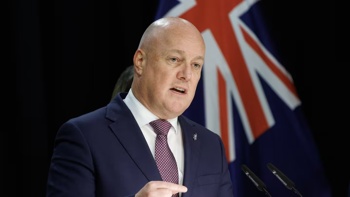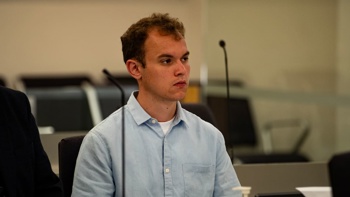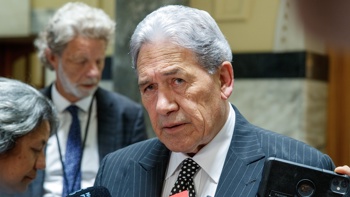

A primary school has been ordered to pay two parents $25,000 after a long-running stoush that began with the family’s inquiry into schools’ child protection policies and led to complaints and then investigations by multiple authorities.
Around 2018, parents Rachel and Regan Cunliffe asked to see the formal child protection policy of their local school, Helensville Primary School, after an incident with another parent. They found it did not have one.
This led them to discover that nearly a quarter of the country’s schools did not specify whether they had such a policy and 3 per cent did not have one at all.
/cloudfront-ap-southeast-2.images.arcpublishing.com/nzme/4RMDGSCEWNGZVDPLGE5TMKMU4I.jpg)
Rachel and Regan Cunliffe have been involved in a case before the Human Rights Review Tribunal.
A child protection policy is a legislative requirement for all schools under the Vulnerable Children Act. It provides a mechanism for reporting abuse and must be available either on a school’s website or visibly at its premises.
After the Cunliffes’ inquiries into the Helensville Primary School policies, they complained to the school’s principal and the board, who discussed the matter at a staff meeting.
The Cunliffes then made an information privacy request from the school in 2018 for information it held about them.
/cloudfront-ap-southeast-2.images.arcpublishing.com/nzme/3ZZTQ4LL6FCLDCEZ72QIKO5F2A.jpeg)
Helensville Primary School was caught up in a dispute over its child protection policy. Photo / Facebook
Anyone can ask for information any organisation or company in New Zealand holds about them and in most cases it must be released within 20 working days.
However, the school refused three separate requests from the Cunliffes, who then took the matter to the Privacy Commissioner.
After this complaint, the school’s board released 72 emails to the couple in April 2020, with a further 49 emails released after that.
The couple filed a claim with the Human Rights Review Tribunal on the basis that the school had refused to release their personal information to them and had breached the Privacy Act in doing so.
This week, the tribunal agreed in part with the pair and ordered the school to pay them $25,000 in compensation.
The school initially denied interfering with the Cunliffes’ privacy, but at the hearing late last year admitted to “technical breaches” of the act and maintained it had a proper basis for withholding the information.
The Cunliffes said in an emailed statement that the past six years of their lives have been “very, very hard”.
“We have endured ongoing and significant harm caused by Helensville Primary School, members of the community, and others,” they said.
“Schools are entrusted with the care of our children and people need to be able to trust that their schools act lawfully. And if any parent, for any reason, wishes to request information that they are legally entitled to, the school needs to provide it.
“Information that exposes a board is not a reason to refuse it.”
According to the tribunal’s decision, the school refused to release the information because the Cunliffes rejected a request to meet with an employment relations adviser, who has experience in the school sector and was appointed by the board to resolve the escalating situation.
The tribunal said the grounds for the refusal didn’t meet the standard set in the Privacy Act which, among other things, allows for the refusal or redaction of information if doing so could disclose trade secrets, classified or privileged information or the affairs of other people not making a request.
“The board has interfered with Mr and Ms Cunliffes’ privacy. This is not simply a technical breach, it is a breach of one of the fundamental obligations of an agency under the Privacy Act 1993,” the tribunal’s decision reads.
While the Cunliffes sought $10,000 in damages for loss of benefit, they also sought $150,000 for humiliation, loss of dignity and injury to feelings.
The school submitted any humiliation the Cunliffes felt was a “byproduct of their own antagonistic and vindictive campaign brought against the board”.
The tribunal disagreed and said the case could have been avoided if the school had simply released the information without insisting on a meeting with the Cunliffes first.
Rachel Cunliffe was awarded $15,000 while Regan Cunliffe was awarded $10,000. The tribunal declined to order the school to make a public apology to the pair.
The feud between the Cunliffes and the school snowballed to include investigations by Oranga Tamariki, police, the Ombudsman, the Ministry of Education and the Teaching Council.
Helensville Primary School declined NZME’s request made through its counsel for comment on the tribunal’s decision and didn’t respond to a query about whether it now had a child protection policy in place.
A spokesperson for the Ministry of Education confirmed that while having the policy was a legislative requirement it doesn’t keep track of which schools comply.
The Education Review Office does, however, and said that from 2022 to 2023 only 10 schools hadn’t complied with the requirement.
“Based on our experience and the review work we do in schools, boards largely know what their obligations are under the Children’s Act 2014 and take them seriously,” ERO chief review officer Nicholas Poe said.
“Where non-compliance is found, we not only identify and report on it; we also follow through on child safety issues and ensure that schools and services rectify non-compliance as a matter of priority.”
Jeremy Wilkinson is an Open Justice reporter based in Manawatū covering courts and justice issues with an interest in tribunals. He has been a journalist for nearly a decade and has worked for NZME since 2022.

Take your Radio, Podcasts and Music with you









